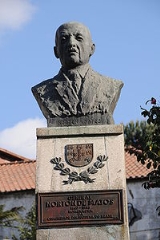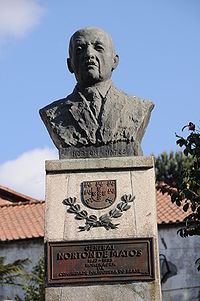
José Norton de Matos
Encyclopedia

Order of the Tower and Sword
The Military Order of the Tower and of the Sword, of Valour, Loyalty and Merit is a Portuguese order of knighthood and the pinnacle of the Portuguese honours system. It was created by King Afonso V in 1459....
, GCL
Order of Liberty
The Order of Liberty, or Freedom, is a Portuguese honorific civil order that distinguishes relevant services to the cause of democracy and freedom, in the defense of the values of civilization and human dignification...
(March 23, 1867 in Ponte de Lima, Portugal
Portugal
Portugal , officially the Portuguese Republic is a country situated in southwestern Europe on the Iberian Peninsula. Portugal is the westernmost country of Europe, and is bordered by the Atlantic Ocean to the West and South and by Spain to the North and East. The Atlantic archipelagos of the...
– January 3, 1955 in Ponte de Lima) was a general and a Portuguese
Portuguese people
The Portuguese are a nation and ethnic group native to the country of Portugal, in the west of the Iberian peninsula of south-west Europe. Their language is Portuguese, and Roman Catholicism is the predominant religion....
politician.
1880s
After attending college in BragaBraga
Braga , a city in the Braga Municipality in northwestern Portugal, is the capital of the Braga District, the oldest archdiocese and the third major city of the country. Braga is the oldest Portuguese city and one of the oldest Christian cities in the World...
, and attending the Escola Académica in Lisbon
Lisbon
Lisbon is the capital city and largest city of Portugal with a population of 545,245 within its administrative limits on a land area of . The urban area of Lisbon extends beyond the administrative city limits with a population of 3 million on an area of , making it the 9th most populous urban...
in 1880, Norton de Matos became part of the mathematics faculty at the University of Coimbra in 1884. He later went to military school and, in 1898, departed for Portuguese India
Portuguese India
The Portuguese Viceroyalty of India , later the Portuguese State of India , was the aggregate of Portugal's colonial holdings in India.The government started in 1505, six years after the discovery of a sea route to India by Vasco da Gama, with the nomination of the first Viceroy Francisco de...
. There, he began his career in colonial administration.
1910s-1920s
Norton de Matos' return to Portugal coincided with Portugal's conversion into a republicPortuguese First Republic
The Portuguese First Republic spans a complex 16 year period in the history of Portugal, between the end of the period of constitutional monarchy marked by the 5 October 1910 revolution and the 28 May coup d'état of 1926...
. He was prepared to serve the new regime, and he soon became the chief of staff of the 5th military division. In 1912 he gained the post of governor-general of Angola
Angola (Portugal)
Angola is the common name by which the Portuguese colony in southwestern Africa was known across different periods of time...
. His leadership was considered instrumental in protecting the Portuguese colony from foreign powers such as England
England
England is a country that is part of the United Kingdom. It shares land borders with Scotland to the north and Wales to the west; the Irish Sea is to the north west, the Celtic Sea to the south west, with the North Sea to the east and the English Channel to the south separating it from continental...
, Germany
Germany
Germany , officially the Federal Republic of Germany , is a federal parliamentary republic in Europe. The country consists of 16 states while the capital and largest city is Berlin. Germany covers an area of 357,021 km2 and has a largely temperate seasonal climate...
and France
France
The French Republic , The French Republic , The French Republic , (commonly known as France , is a unitary semi-presidential republic in Western Europe with several overseas territories and islands located on other continents and in the Indian, Pacific, and Atlantic oceans. Metropolitan France...
.
Norton de Matos was recalled to Portugal in 1915 due to a new political situation that arose in Portugal during the First World War and named Minister of War. In this capacity, he was responsible for organizing the Portuguese intervention on the Western Front
Western Front (World War I)
Following the outbreak of World War I in 1914, the German Army opened the Western Front by first invading Luxembourg and Belgium, then gaining military control of important industrial regions in France. The tide of the advance was dramatically turned with the Battle of the Marne...
.
In 1917, Norton de Matos exiled himself to London
London
London is the capital city of :England and the :United Kingdom, the largest metropolitan area in the United Kingdom, and the largest urban zone in the European Union by most measures. Located on the River Thames, London has been a major settlement for two millennia, its history going back to its...
after disagreements with the new republic
Portuguese First Republic
The Portuguese First Republic spans a complex 16 year period in the history of Portugal, between the end of the period of constitutional monarchy marked by the 5 October 1910 revolution and the 28 May coup d'état of 1926...
. He later returned and became the Portuguese delegate to the Paris Peace Conference
Paris Peace Conference, 1919
The Paris Peace Conference was the meeting of the Allied victors following the end of World War I to set the peace terms for the defeated Central Powers following the armistices of 1918. It took place in Paris in 1919 and involved diplomats from more than 32 countries and nationalities...
, which led to the Treaty of Versailles
Treaty of Versailles
The Treaty of Versailles was one of the peace treaties at the end of World War I. It ended the state of war between Germany and the Allied Powers. It was signed on 28 June 1919, exactly five years after the assassination of Archduke Franz Ferdinand. The other Central Powers on the German side of...
. Later he returned to Angola as High Commissioner of the Republic, from 1921 to 1923, before becoming Portuguese ambassador to the United Kingdom
United Kingdom
The United Kingdom of Great Britain and Northern IrelandIn the United Kingdom and Dependencies, other languages have been officially recognised as legitimate autochthonous languages under the European Charter for Regional or Minority Languages...
from 1923 to 1926. In 1929 he was elected a Grand Master of the Masons
Freemasonry
Freemasonry is a fraternal organisation that arose from obscure origins in the late 16th to early 17th century. Freemasonry now exists in various forms all over the world, with a membership estimated at around six million, including approximately 150,000 under the jurisdictions of the Grand Lodge...
in Portugal.
1940s
Norton de Matos returned to teaching, accepting a position as professor at the Instituto Superior TécnicoInstituto Superior Técnico
Instituto Superior Técnico is a reputed school of engineering, part of Universidade Técnica de Lisboa . IST is the largest and the most prestigious school of engineering in Portugal...
, but was dismissed from his chair. He then became a leading opposition figure against the Salazar
António de Oliveira Salazar
António de Oliveira Salazar, GColIH, GCTE, GCSE served as the Prime Minister of Portugal from 1932 to 1968. He also served as acting President of the Republic briefly in 1951. He founded and led the Estado Novo , the authoritarian, right-wing government that presided over and controlled Portugal...
regime. In 1943, he was named to the National Council of Movement of National Antifascist Unity
Movement of National Antifascist Unity
The Movement of National Antifascist Unity was a political platform of democratic organizations that struggled against the Portuguese fascist-leaning regime, led by António de Oliveira Salazar...
, or MUNAF, and on his 81st birthday, he was named the opposition candidate for President in the rigged election of 1949, under the dictatorial Estado Novo regime, while demanding freedom to advertise his message and the close inspection of votes. The regime refused these demands, and Norton de Matos withdrew from the election on February 12, 1949.
Norton de Matos continued to lead a democratic opposition movement centered in the city of Oporto. He died in the city of his birth in 1955.

